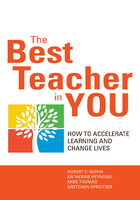
Who Should Read This Book?
This book is written for teachers at all levels and in any field who are hungry to learn and develop. Experienced teachers who currently excel may find companionship in this book. In our workshops and interviews, we found that most schools are uncomfortable with the “highly effective” distinction. We heard many stories of principals telling teachers to keep quiet about being invited to these workshops. But when we brought these teachers together, they were thrilled to hear from one another. This book may provide companionship and learning for those who feel that their excellence goes unseen.
Experienced teachers who feel discouraged may find inspiration in this book. The stories of HETs are of developing teachers who learn to move to higher levels of performance. Their accounts may stimulate the courage to engage in new experiments and new learning.
Current students in teacher education programs and new teachers may find higher levels of aspiration in this book. The performance achieved by HETs illustrates excellence and suggests paths to get there. The accounts of the HETs may bring an expanded vision of what is possible.
Administrators and policy makers may find a new strategic perspective. The administrative world is dominated by a problem-solving perspective. Policies are shaped to fix what is wrong with the system. HETs illustrate what is most right with the system. The excellence of HETs invites a shift in focus from what should be fixed to what should be pursued. Seeking out, paying attention to, and learning from the best teachers may have a payoff. This book may instill a desire for such a shift in perspective.
People responsible for the professional development of educators may find a new approach to their work. When we present the material in this book, people often ask, “Can HETs be developed?” We respond that teachers are more likely to become HETs if they are challenged and supported in the same ways that HETs challenge and support their students. That is, if we were to teach teachers the way the best teachers teach students, teacher development might accelerate and lives might change.
There is a large group of people outside professional education who desire to become more effective. These people may find that teaching is simply a metaphor for leading and that great teaching is a metaphor for great leading. By reading about the work of HETs, it may be possible to gain insights into how to better accelerate learning and change lives in any setting.
While this book is intended to help practitioners reflect on their own experiences, scholars may find some insights worthy of attention. In this work we do not make systematic comparisons between HETs and other teachers, so we can draw no generalizable conclusions about what differentiates them. We do however make comparisons. As students, each of the authors spent thousands of hours in classrooms. We then became professional educators. As a result, we made many observations about teaching and formed assumptions about what makes teaching more or less effective. As we listened to the HETs, we compared what they said with our own accumulated experiences. We particularly focused on the things that challenged and surprised us. Their statements may also surprise you.
In each chapter we offer a case study, and then we make sense of the processes being described. From our qualitative data, we provide insights and offer propositions about effective teaching. Until these are systematically tested, we will not know if they hold. We hope that the grounded observations made here might stimulate such work.